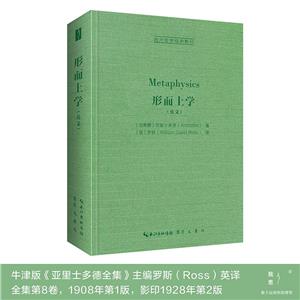CH.A.
1.The advance from sensation through memory,experience,and art,to
theoretical knowledge.
2.Characteristics of 'wisdom' (philosophy).
3.The successive recognition by earlier philosophers of the material,
efflcient and nal causes.
4.Inadequacy of the treatment of these causes.
5.The Pythagorean and Eleatic schools;the former recognizes vaguely
the formal cause.
6.The Platonic philosophy;it uses only the material and formal causes.
7.The relation of the various systems to the four causes.
8.Criticism of the pre-Platonic philosophers.
9.Criticism of the doctrine of Ideas.
10.The history of philosophy reveals no causes other than the four.
a
I.General considerations about the study of philosophy.
2.There cannot be an infinite series,nor an infinite variety of kinds of
causes.
3.Different methods are appropriate to different studies.
B.
1.Sketch of the main problems of philosophy.
2.Fuller statement of the problems:--
(i) Can one science treat of all the four causes?
(ii) Are the primary axioms treated of by the science of substance,
and if not,by what science?
(iii) Can one science treat of all substances?
(iv) Does the science of substance treat also of its attributes?
(v) Are there any non-sensible substances,and if so,of how many
kinds?
3.(vi) Are the genera,or the constituent parts,of things their first
principles?
(vii) If the genera,is it the highest genera or the lowest?
4.(viii) Is there anything apart from individual things?
(ix) Is each of the first principles one in kind,orin number?
(x) Are the principles of perishable and of imperishable things the
same?
(xi) Are being and unity substances or attributes?
5.(xii) Are the objects of mathematics substances?
6.(xiii) Do Ideas exist,as well as sensible things and the objects of
mathematics?
(xiv) Do the first principles exist potentially or actually?
(xv) Are the first principles universal or individual?
□(特殊字體)
1.Our object is the study of being as such.
2.We must therefore study primary being (viz.substance) unity and
plurality,and the derivative contraries,and the attributes of being
and of substance.
3.We must study also the primary axioms,and especially the law of
contradiction.
4.Fatal difficulties involved in the denial of this law.
5.The connexion of such denial with Protagoras'doctrine of relativity
the doctrine refuted.
6.Further refutation of Protagoras.
7.The law of excluded middle defended.
8.All judgements are not true,nor are all false;all things are not at
rest,nor are all in motion.
……
□(特殊字體)
E.
z.
H.
□(特殊字體)
I.
K.
□(特殊字體)
M.
N.















